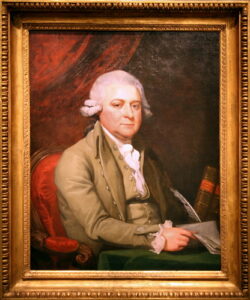Winner of the Spring 2017 StMU History Media Awards for
Best Article in the Category of “People”
On January 30, 1933, Adolf Hitler was appointed Chancellor of Germany. Hitler quickly turned Germany’s fragile Weimar democracy into a one-party dictatorship. During his rule, Hitler pursued a plan to harass one half-million German Jews to leave Germany. Hitler promoted a “master race” scheme that sought to keep the so-called Aryan race pure from racial contamination from all other races he deemed to be inferior. This Aryan race consisted of only Germanic peoples who had the characteristics of blond hair, blue eyes, and light colored skin. Three years after taking power, Hitler hosted the 1936 Olympics in the German capital of Berlin. This was his opportunity to put his “New Germany” on display for all the world to see.

As Hitler’s Nazi government prepared for these Olympics, athletes from the United States were also preparing themselves for the coming competition in Berlin. In the United States, African Americans were dealing with their own problems of racism. Not only was life hard as an African American in the 1930s, but life was even harder as an African American athlete. One African American, who would later become one of the most famous athletes in the history of Track and Field, was James Cleveland “Jesse” Owens. At the age of eight, he had moved to Cleveland, Ohio with his family, who had sought for better work and educational opportunities. “On his first day of school, he introduced himself as ‘J. C.,’ but his teacher misunderstood him to say “Jesse.” The young Owens bashfully accepted the mistake, thus taking on the name by which he would become famous.”1 Jesse Owens would grow up loving to run. He was the fastest runner in his school and loved competing against others. His dream was to attend the University of Michigan, but there were no scholarships offered in those days and his parents could not afford tuition. Instead, he attended Ohio State University, where he worked for the boosters to pay for his expenses.
In the Summer of 1936, at the Olympic trials, Jesse finished first in all three of the events that he competed in. He had trained hard in the preceding months, and the hard training paid off, allowing Owens to attend the Olympics of 1936, known as “The Nazi Games” or as “Hitler’s Games.” In actuality, these Olympic games were not originally intended to be games hosted by the Nazis: the “Nazis were never invited to host the Games—and probably never would have applied to do so. Instead, the International Olympic Committee (IOC) had awarded the Olympics to Germany’s Weimar Republic in 1931 before the Nazi takeover as a way of welcoming Germany back to sports respectability.”2

Ironically, Adolf Hitler knew nothing about sports and expressed little interest in hosting the Olympics; instead he wished to host an all-German athletic celebration. “But Dr. Josef Goebbels, the influential minister of propaganda, glimpsed how Germany might score a tremendous public-relations coup and convinced Hitler to support both the Winter and Summer Games.”3 Influenced by Dr. Josef Goebbels, Hitler used these Olympic games as a political relation with other countries.
Several weeks after the Olympic trials, Jesse Owens competed in the Berlin Olympics and made a name for himself. He won four gold medals, in the 100m, 200m, 4x100m relays, and in the long jump. Jesse Owens had set records and represented America in a humble and most respectable way, considering the circumstances. Even though many have claimed that Adolf Hitler refused to congratulate Jesse Owens, others go further by claiming that Hitler actually “snubbed” Owens:
By the end of that fabulous week in Berlin, an attractive yarn attached itself to the name of Jesse Owens. Supposedly, he was ‘snubbed’ by Adolf Hitler, who reportedly refused to congratulate him publicly after his victories. Actually, the story was concocted by American sportswriters, who were all too willing to read the worst of motives into Hitler’s behavior and to assume innocent excellence from America’s newest hero. Although it had no basis in fact, the story of ‘Hitler’s snub’ was repeated so often that people took it as truth. It remains one of the great anecdotes of American popular culture.4

Racism was as alive in the United States as it was overseas in Germany in the 1930s. German Jews were a persecuted minority in the 1930s, and African Americans were experiencing similar treatments of racism in 1930s America. “World reaction to Hitler’s program resulted in a movement to boycott Nazi goods and services, which included a movement to take away the 1936 Olympics from Berlin in an attempt to force the German government to cease its discriminatory practice against the Jews.”5 It was not until the United States entered World War II that sentiment against racism began to penetrate the American social consciousness. Even though Owens continued to face white racism in his own country subsequent to his Olympic victories, he later reflected on his experiences of racism: “What I’ve done is no more than countless other Negros (and Jews, Poles, Greeks and just Americans in general) have done…. I’ve been a Negro in America for fifty-seven years, and I want to tell you that [being black in America] can be pure hell at times and can shake anyone’s sureness. Often it’s worse if you were the world’s fastest human.”6 When Owens returned to the United States after the Olympics, President Franklin Delano Roosevelt refused to acknowledge his accomplishments or even invite him into the White House. It was not until 1979 that President Jimmy Carter presented Jesse Owens with the Living Legend Award. Forty-three years after his Olympic victories, Jesse Owens had finally been properly recognized for his great achievements.
Despite all the controversy that Jesse Owens encountered while doing what he loved, he is a true representation of perseverance and determination. Jesse Owens passed away in March of 1980 from lung cancer.
- Salem Press Biography Encyclopedia, January 2017, s.v. “Jesse Owens,” by William J. Baker. ↵
- John Rodden and John P. Rossi, “Berlin Stories,” Commonweal 143, no. 13 (August 12, 2016): 25. ↵
- John Rodden and John P. Rossi, “Berlin Stories,” Commonweal 143, no. 13 (August 12, 2016): 26. ↵
- Salem Press Biography Encyclopedia, January 2017, s.v. “Jesse Owens,” by William J. Baker. ↵
- D. A. Kass, “The Issue of Racism at the 1936 Olympics,” Journal of Sports History, no. 3 (1976): 223. ↵
- Joseph Boskin, “Jesse Owens: Running in the American Dilemma,” Review in American History, no. 3 (1987): 457. ↵



161 comments
Bianca-Rhae Jacquez
Jesse Owens story is inspiring and extremely remarkable. I wished that President Roosevelt would’ve commended Ownes on his amazing efforts and on the 4 medals that he was able to win. I think it was fair that Carter later recognized him for his historic accomplishments. I think this article rightfully deserves the award that it won it was a beautifully written piece.
Antonio Coffee
I had heard the story of Jesse Owens being snubbed by Hitler after winning his events, and I have always taken it as the truth. I did not realize that this was a story made up by American journalists in order to smear Hitler just a little bit more and build up Jesse Owens. Even though that story is false it is still amazing that Owens was able to do everything he did and hold his head up high facing all the persecution that he did in a foreign land controlled by Nazis.
Oscar Ortega
Jesse Owens is one of the most famous athletes in American history due to both his status as an accomplished black Olympic athlete in a period in America where such a thing was exceptionally rare, and for being so during the Olympics which were now infamously hosted by the Nazi party, who are more than well-known for their racial opinions. Regardless, Jesse Owens’ story is important, as it shows a person who, through caring and loving something enough, to train and hone his talent into skill worthy of one of the most important of athletic competitions. I personally did not know of Owens’ lack of recognition at the time of his accomplishment, and learning that that happened, and knowing that he did eventually receive it was magnified by the writing of the article.
Ryan Estes
I loved this article. Jesse Owens was a national hero. Ever since the time of the American Revolution, Americans have never liked anyone else telling them what to do. Jesse really showed Hitler that Americans were not going to back down even before the Second World War started. In his own way, he was unknowingly a true piece of the puzzle for the Allied victory at the end of World War II.
Emily Velazquez
I had never heard of James Cleveland “Jesse” Owens. I am so glad that he was able to receive recognition for his accomplishments. However, I still think it was so unfair how he did not receive any at the time he accomplished and deserved it but had to wait forty-three years after he ran the fastest in the Olympics to finally get recognized by President Jimmy Carter.
Noah Bolhuis
I would consider myself a sports fan in general, and that would include the Olympics. I have heard of this story, but never the specifics, and after reading it I have a new appreciation for what the Olympics stand for, and what they mean to a country’s morale and fighting spirit. Jesse Owens, nearly single handedly, ruined Hitler’s plan of the 1936 Olympic games, and really hurt the German morale.
Christopher Metta Bexar
Jesse Owens did punch a hole in Hitler’s Olympics. Hitler wanted them to be a showcase of Aryan superiority. Any Jew or person of color winning would have been an affront.
I truly believe the legend that Hitler snubbed Jesse Owens.
What is informative is to be reminded that Franklin Roosevelt was in no position to invite Owens to the White House (the South was still the Old South)
Nathalie Herrera
The story of Jesse Owens is remarkable, winning four gold medals and making a name for himself in history. His determination and resilience is greatly respected yet it sad to read that he did not earn this respect immediately. Especially coming back home when President Roosevelt ignored his great accomplishments, but he would later be recognized by President Carter. His legacy will live on and in turn inspire many others that hard work and patience does pay off.
Raymond Munoz
After reading this article I feel that it should also win an award for best storyteller, because the author does an amazing job of giving the audience just the right amount of information and keeping the story narrowed at the same time. Now, I do think it is a shame that President Roosevelt never commended Jesse Owens for his accomplishments, but I think it must also be remembered that it’s not about the recognition. It’s about making the impact and changing lives, which Jesse Owens did amazingly.
Miguel Rivera
Jesse Owens is a name almost everyone who is a sports fan knows, I just wish that he was a household name outside of sports as well. His accomplishments were done during a very important time in our history, but it should be looked at especially during today’s issues. I am happy to read that President Carter awarded him with the recognition that he deserved.